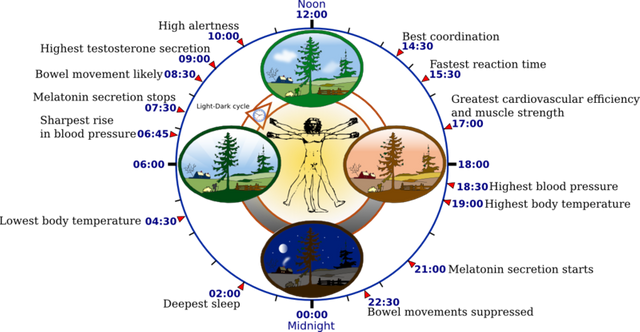How do we perceive time?
Who or what plays a primary role in the work of the "biological clock" - a mechanism that allows man and most plants and animals to preserve the "sense of time"?
- A few decades ago it was believed that light is the main factor that regulates the work of "internal clocks", which actually allow the body to adapt to changing day and night, seasons, maintain a diet and sleep. For example, scientists at the University of Leiden studied why our internal biological clocks show different times. By measuring the temperature of the body, experts have determined that the internal clock is set at different times in relation to sunset. Therefore, someone's bodies just wake up much later. And nothing can be done about it - it's impossible to go against nature. Even if a cruel fate forces such people to start working early, they will still sleep at any opportunity in the morning until the last moment. In the majority of people, biological fluctuations are small, and the body is set up to function actively during the day and without problems get out of bed after sunrise.
- Of course, among the main factors of our time perception is the usual human habit.
What should a pilot do if he, a poor fellow, flying in broad daylight, say, over the Atlantic, mortally wants to sleep - because he already has a deep night at home? It is not helped by another cup of strong coffee, no conversations with other crew members, who are also overcome by a desperate yawn, and thousands of kilometers ahead and several hours of flight ahead.
The way out of this predicament seems to be simple - during hours of unbearable drowsiness, one should not sit at the helm at all. Many catastrophes occurred precisely because during the flight fatigue plunged into a general sleep the whole crew. The schedule for biological watches aviators - for the first time in the world practice - began to be tested since March 1999. - As it turned out, both the temperature and its changes also play a primary role in the work of the "biological clock". So at least in the late 1990s, the scientists of the medical faculty in Hanover (New Hampshire) began to approve. As the object of study was chosen the bread mold - Neurospora (it is her biologists used most often in their studies). American researchers concluded that the amount of special protein produced by this organism to slow or speed up biological rhythms depended more on temperature than on light. In their opinion, this property is inherent not only in plants, but also in mammals, in particular, mice and, especially, humans.

Your Post Has Been Featured on @Resteemable!
Feature any Steemit post using resteemit.com!
How It Works:
1. Take Any Steemit URL
2. Erase
https://3. Type
reGet Featured Instantly & Featured Posts are voted every 2.4hrs
Join the Curation Team Here | Vote Resteemable for Witness
You got a 25.00% upvote from @sunrawhale courtesy of @leonid96!
This service has been created with the help of @yabapmatt so please show your support by voting for him for witness!
You got a 2.13% upvote from @emperorofnaps courtesy of @leonid96!
Want to promote your posts too? Send 0.05+ SBD or STEEM to @emperorofnaps to receive a share of a full upvote every 2.4 hours...Then go relax and take a nap!